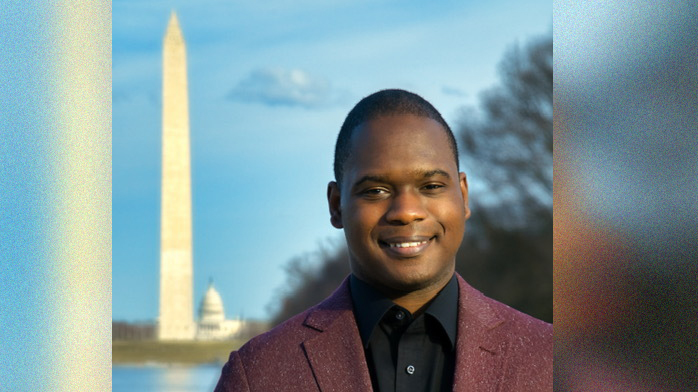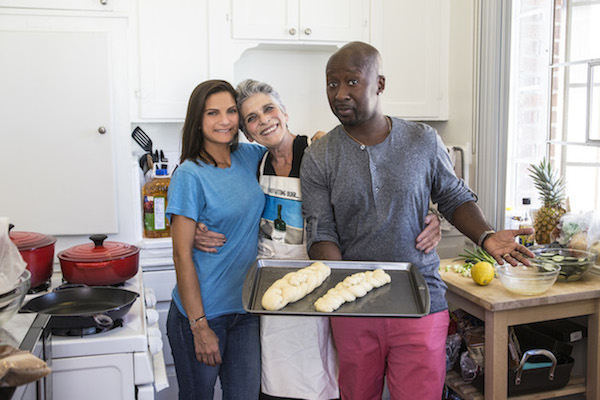Joshua Maxey is an advocate for JoC and LGBTQ+ Jewish voices. His story shares the difference one person and one welcome embrace can make in our lives.
Growing up, Joshua Maxey embraced the idea of “b’tzelem elohim” that we are all made in God’s image. While these weren’t the words they used at the church where he grew up in Rochester, NY, Maxey always felt a sense of love and embrace. As Maxey grew older, ideas around community love and acceptance became more complicated. He would often hear the pastor condemn people who were LGBTQ+ being gay at the same time that marriage equality was being talked about negatively in public spaces. Knowing that those around him held these “traditional” Christian views, Maxey struggled to understand how he could go from feeling so loved to so unwelcomed in the community. Maxey was at a point where he would have to choose–would he follow those “traditional” ways in Upstate New York and live a closeted life, or live a life where he could be his full authentic self? Would he leave to find somewhere where he could, in his words, “love out loud and be celebrated.”
Hoping to figure out what beliefs were central to his core, Maxey went to college. He then landed in Washington, D.C., working with the unhoused community. During this time, often on trips to New York City, Maxey was challenged and supported by his best friends and began to establish his own sense of values and identity. One trip to New York City would change the course of Maxey’s life.
While walking on a Summer day on the Upper East Side, Maxey found himself drawn to a beautiful building. He entered the building’s doors where he was welcomed with a warm embrace. The woman at the front desk shared that the space was a synagogue and that she would be happy to give Maxey a tour of the sanctuary. They also looked at the archives. Maxey experienced the history of the temple’s various religious artifacts. As their time wrapped, the woman encouraged Maxey to have a seat in the sanctuary. “You can pray here if you’d like,” the woman offered. Maxey, although not Jewish at the time or even “being spiritual” took the opportunity to sit, think, and pray.
Sitting in the sanctuary, Maxey reflected on his life until that point and the person he was at that moment in time. Maxey describes the feeling of being there as an emotional relief, like the lifting of a weight from his shoulders. Maxey left the sanctuary that day thinking, “I don’t know what that was, or what that experience was. But I liked that, and I don’t want that to go away.”
The relief and wholeness Maxey felt that day at the sanctuary didn’t go away. From then on, Maxey explored what it would mean for him to live Jewishly in Washington, D.C.. He began observing Shabbat, holidays and keeping kosher. Eventually, he decided that it was important for him to be a part of a Jewish community. Practicing Judaism on his own was safe and personal, and the idea of entering predominantly white Jewish spaces came with layers of fear and uncertainty. Would everyone he would meet be as welcoming as the receptionist he encountered in New York City? How would he be perceived? He knew the potential outcome would be worth facing these fears and questions.
Maxey’s questions and unease around being in Jewish spaces were warranted. At first, hints of being classified as “other” were subtle–a person staring or not saying hello. Then, the more embedded Maxey was in the community; the deeper people would pry. Maxey would regularly get asked questions like, “Are you Jewish?” “When did you convert?” “Do you have a wife?” These questions quickly turned a space that once held so much calm relief into a space of awkwardness and discomfort. The need to constantly defend his place in the synagogue led Maxey to ask himself, “Is this where I truly belong?”
For Maxey, the peak of unwelcomeness arrived during the temple’s Hanukkah event. As Maxey was leaving the celebration he heard a woman whisper to the security guard, “Oh! Is that a new security guard?” The prying, assumptions, and otherness left Maxey with a decision. He was going to go to services virtually.
 As Maxey contemplated his role in his new synagogue community, the Washington Hebrew Congregation partnered with B’nai Israel Congregation and got involved with Join for Justice, an organization dedicated to tackling racism and calling upon Jewish spaces to actively engage in anti-racist work and organizing. This step kept Joshua engaged in synagogue life. For him, this partnership marked a recognition that his synagogue’s leadership was serious about being inclusive and working to actively create a more equitable Jewish community, but also, the power of two synagogues from different movements working together to address these issues in our community is an example for the larger Jewish community in the United States. As Maxey says, “no matter the denomination or movement, we all as a Jewish people have the responsibility to welcome, because we are a beautiful mosaic of people.”
As Maxey contemplated his role in his new synagogue community, the Washington Hebrew Congregation partnered with B’nai Israel Congregation and got involved with Join for Justice, an organization dedicated to tackling racism and calling upon Jewish spaces to actively engage in anti-racist work and organizing. This step kept Joshua engaged in synagogue life. For him, this partnership marked a recognition that his synagogue’s leadership was serious about being inclusive and working to actively create a more equitable Jewish community, but also, the power of two synagogues from different movements working together to address these issues in our community is an example for the larger Jewish community in the United States. As Maxey says, “no matter the denomination or movement, we all as a Jewish people have the responsibility to welcome, because we are a beautiful mosaic of people.”
Today, Maxey is part of the change in his synagogue community. He is the co-chair of his temple’s internal diversity, equity, and inclusion working group, where they are thoughtfully looking at their website, board composition, staff, and more to address how they are inclusive of the whole community. Through this working group, Maxey has been instrumental in creating an affinity space for Jews of Color and another affinity space for LGBTQ+ Jews in the community.
Maxey’s commitment to Jewish diversity goes beyond his synagogue walls as well. Professionally, Maxey is the executive director Bet Mishpachah, DC’s only LGBTQ+ synagogue in Washington, D.C. Maxey’s mission is to bring Jews of Color and LGBTQ+ Jews to the table. Maxey is passionate about ensuring that JOC and LBGTQ+ Jewish voices are heard and understood and that they are part of the conversation to move things forward and not just to check off a box. For himself, Maxey shares, “If you are expecting me to just be another face on the wall, that’s not who I am.”
As Maxey continues to be a leader in uplifting JOC and LGBTQ+ Jewish voices, he hopes that he can inspire others. He hopes that people see themselves in him and know that there is a community that embraces them.
For those in the Washington, DC area, Maxey invites you to attend a community-wide Juneteenth Shabbat Service on Friday, June 17th.







